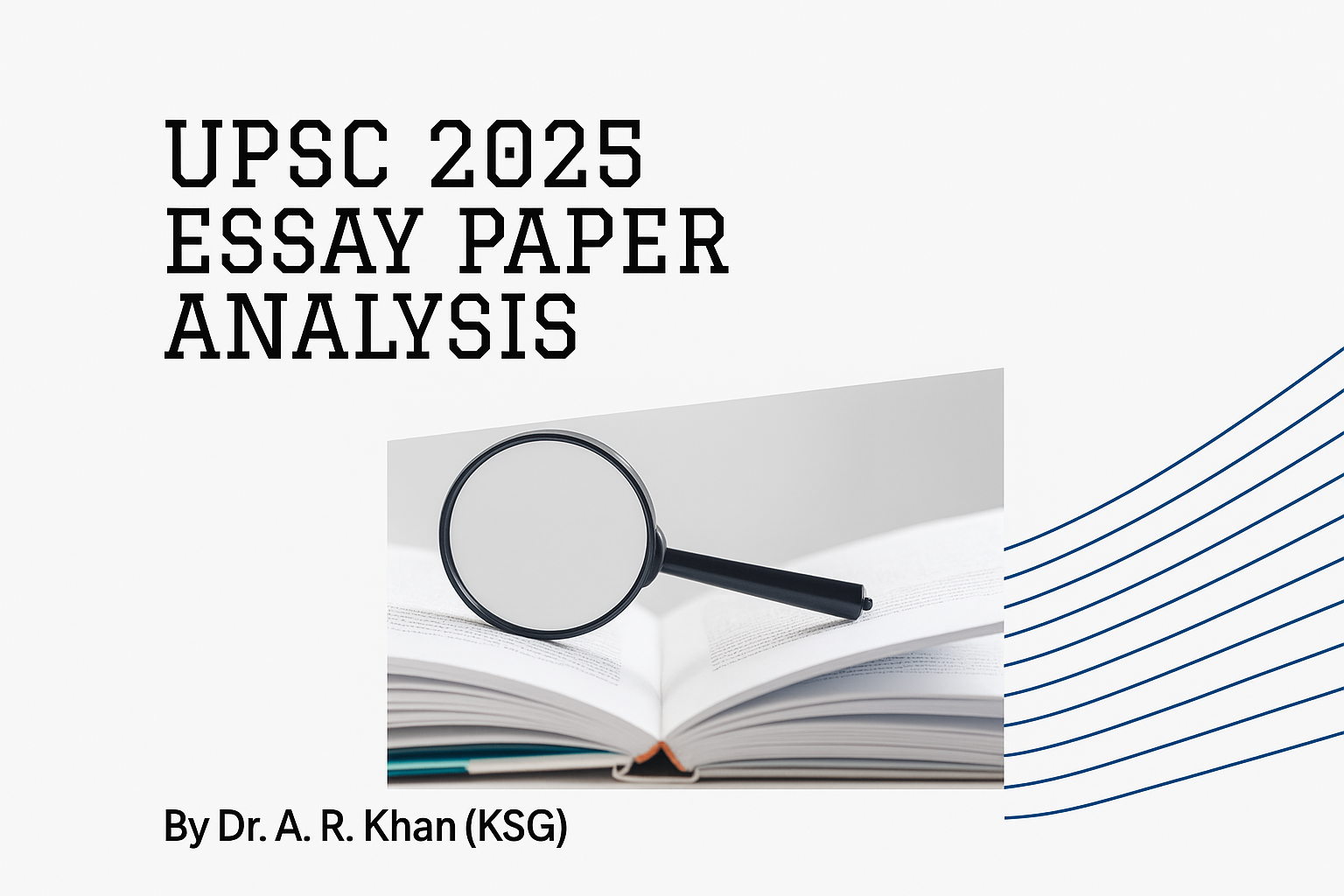By Dr. A. R. Khan
Every year, the UPSC surprises aspirants with its essay paper. 2025 was no exception. At first glance, the topics looked deceptively simple — but behind their veneer of simplicity lay deep, abstract, and philosophical challenges meant to test more than just memory.
The commission seems less interested in a “walking encyclopedia” of facts and more inclined towards candidates who can think critically, interpret maturely, and express ideas with clarity. This year’s eight essay topics were designed to spark reflection, creativity, and multi-dimensional thinking.
Why These Topics Matter
The shift toward abstract and philosophical themes highlights UPSC’s emphasis on intellectual maturity. Instead of rewarding rote knowledge, the exam now seeks candidates who can connect ideas across philosophy, history, politics, ethics, and personal experience.
Each quote was definitive — not a question, but a strong assertion — demanding nuanced interpretation. Importantly, most topics allowed for multiple dimensions of thought, from the personal to the societal, from the spiritual to the political.
The Eight Essay Topics
- Truth Knows No Color
This essay called for reflection on the universality of truth. From Gandhian Satya to Plato’s theory of forms, from Advaita Vedanta’s distinction between Brahman (truth) and Maya (illusion) to modern debates on objectivity, the topic encouraged exploring truth as timeless and unbiased — beyond prejudice, culture, or perception.
- The Supreme Art of War Is to Subdue the Enemy Without Fighting
Inspired by Sun Tzu’s Art of War, this theme resonates with diplomacy, non-violence, and even self-mastery. It links to Gandhian philosophy, Chanakya’s strategies (saam, daam, bhed) sans dand, and the idea that true victory often lies in restraint, persuasion, or inner discipline rather than brute force.
- Thought Finds a World and Creates One Also
A deeply abstract topic, this explored the power of ideas. From existentialist philosophy (existence precedes essence) to Indian wisdom (yathā śraddhā tathā siddhi), it highlighted how thoughts are not passive but creative — shaping revolutions, technologies, literature, and even personal destinies.
- The Best Lessons Are Learned Through Bitter Experiences
Rooted in folk wisdom, this topic resonates across history and personal life. Think Nietzsche’s amor fati, Nassim Taleb’s Antifragile, or Angela Duckworth’s Grit — all emphasizing perseverance, hardship, and the transformative role of failure.
- Muddy Water Is Best Cleared by Leaving It Alone
Counterintuitive yet profound, this theme linked with Buddhist patience, Daoist wu-wei (effortless action), and even Adam Smith’s laissez-faire economics. It suggested that sometimes restraint, not intervention, leads to resolution — whether in personal life, governance, or conflict.
- The Years Teach Much Which the Days Never Know
A meditation on time and wisdom, this topic contrasted immediacy with long-term perspective. Drawing from Kabir’s couplets, historicism in Western thought, and the patience required in policymaking, it underlined how deeper truths emerge only through experience and reflection.
- It Is Best to See Life as a Journey, Not as a Destination
This familiar yet layered theme invited exploration of Karma Yoga, the philosophy of doing over achieving, and the “happiness of pursuit” rather than pursuit of happiness. While seemingly cliché, it tested whether candidates could move beyond superficiality to uncover deeper layers of meaning.
- Contentment Is Natural Wealth; Luxury Is Artificial Poverty
A thought-provoking assertion with echoes of Gandhian simplicity, Sufi traditions, Stoic restraint, and Jain aparigraha. It also connected to modern economics and psychology — questioning consumerism and redefining what it means to be wealthy.
The Larger Lesson for Aspirants
The 2025 essay paper once again made it clear: UPSC is not testing facts, it is testing minds. Success requires more than data; it demands the ability to interpret abstract ideas, connect them across disciplines, and express them meaningfully.
The real preparation, therefore, lies not only in practicing essay writing but also in practicing thinking — cultivating intellectual maturity and the ability to weave ideas into a coherent narrative.
As the paper showed, the challenge was not in “finding” content in books, but in drawing from within one’s own reflections. Essays, after all, are not just about writing — they are about interpreting, connecting, and expressing with clarity.
UPSC doesn’t just want informed candidates; it wants thinkers, leaders, and visionaries. And the 2025 essay paper was a reminder of exactly that.
This is rough transcript of the Review Video of Essay Paper made by Dr A R Khan available on KSG IAS YouTube Channel
Watch Video Here

